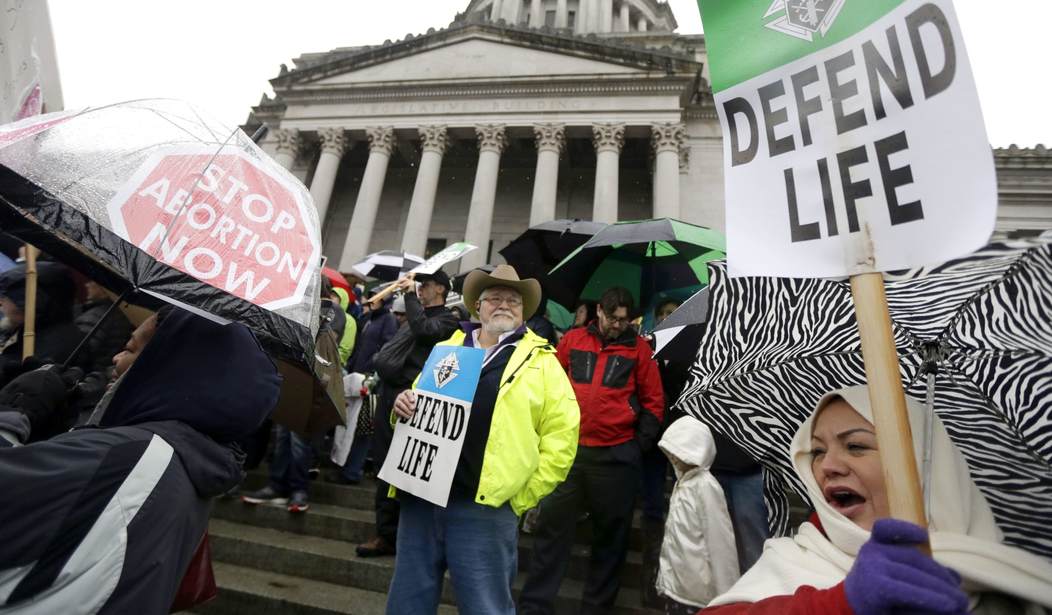Donald Trump told MSNBC that women who receive abortions should face criminal charges if the nation outlaws abortions.
Oklahoma is one signature away from doing that, and putting abortion doctors in prison, too.
The Oklahoma legislation is only one example of how pro-life groups are using state legislatures to do what their attorneys have been unable to accomplish: unraveling Roe v. Wade.
“The dialogue is dominated by those who have demonized this totally normal part of healthcare,” Dr. Diane Horvath-Cosper, an OB-GYN, told the New York Times.
New laws in three states would criminalize abortion, force clinics to move away from schools, and require anesthesia to be administered in abortions after 20 weeks, for the fetus’ sake.
Oklahoma
The tornadoes that tore through her state the second week of May had to be at the top of Oklahoma Gov. Mary Fallin’s daily planner. But she was also faced with the prospect of signing what pro-choice forces considered an incredibly draconian piece of legislation – a new law that would outlaw nearly all abortions in the state and put abortion doctors in jail for at least a year.
SB 1552, which was sent to Fallin the week before the twisters hit Oklahoma, would do more than strip doctors of their medical licenses if they perform abortions. The law would also make it a felony to perform an abortion, with an exception only if the abortion was needed to save the mother’s life.
SB 1552 also states that suicide threats by the mother would not constitute a life-threatening situation.
Dawn Laguens, executive vice president of Planned Parenthood Federation of America, in an emailed statement to Mother Jones magazine, said the legislation was nothing but a ban on abortion.
“Punishing doctors for performing a legal, medical procedure is an assault on women. As a healthcare provider, we have seen the very real and very disastrous impact these bills have on women’s lives,” she said. “Women are forced to drive hundreds of miles, and across state lines. Americans overwhelmingly disapprove of this extreme agenda, and Oklahomans will not stand for this.”
Political observers in Oklahoma said they couldn’t be sure if she would sign SB 1552, but Fallin has a history of supporting anti-abortion legislation.
Alabama
Alabama abortion supporters complain their state legislature wants to treat abortion doctors and clinics like sex offenders.
Alabama Gov. Robert Bentley signed this week legislation to force two of the state’s three largest abortion clinics to either close or move because they are within 2,000 feet of an elementary or middle school.
State Sen. Paul Sanford, the sponsor of the legislation, said he was only trying to protect children from the “chaos” of going to school near an abortion clinic that might be surrounded by protesters.
Susan Watson, the executive director of the American Civil Liberties Union of Alabama, told AL.com her organization would take legal action if Bentley signed Sanford’s bill.
“With precious little time remaining in the legislative session, and in the face of so many issues facing the state, Alabama’s elected officials chose to focus on attacking women’s healthcare,” Watson said. “We know that restrictions like these only endanger the health and safety of Alabama women.”
Watson also promised legal action to block another piece of Alabama legislation – also signed by the governor this week – that would ban what doctors call a “D&E” or “Dilation and Evacuation.”
Mary Spaulding, the director of state legislation for the National Right to Life Committee, which supports the Alabama bill, described the D&E procedure as a “dismemberment abortion,” or “tearing babies limb from limb” when she was campaigning for a similar proposal in Kansas in 2015.
“Before the first trimester ends, the unborn child has a beating heart, brain waves, and every organ system in place,” Spaulding said during a speech in Wichita. “Dismemberment abortions occur after the baby has reached these milestones.”
Utah
Pro-choice forces in Utah are unhappy with a law that took effect May 9 to force abortion doctors to administer anesthesia to a fetus about to be aborted at or after 20 weeks. The goal is not to protect the mother; rather, it is to save the fetus from pain.
Opponents argue this first-of-its-kind abortion legislation is not only unnecessary, but impossible.
Dr. Leah Torres, an OB-GYN in Salt Lake City, told the Salt Lake Tribune there is no way to administer pain relief to a fetus.
“The fetus is given a paralytic as a form of anesthesia but not a pain reliever,” Torres said. “Either I will continue to provide the medical standard of care to my patients that result in breaking a law I don’t know how to follow, or I’m going to have to invent some sort of fetal analgesia and essentially experiment on my patients in order to comply with the law.”
Planned Parenthood of Utah CEO Karrie Galloway said the new law was “harassment of women, plain and simple.”
But those on the pro-life side of the debate in Utah argued it is the assertion that a fetus can feel pain at 20 weeks that bothers their pro-choice opponents, not the condition of the mother.
Sen. Curt Bramble (R), the sponsor of the legislation, said he thought it ludicrous that Utah bent over backward to protect animals and even convicted killers from pain during euthanasia and execution, but did not afford the same care and comfort to a fetus.
“The sanctity of life, protecting those who have no voice — that’s what this (bill) is about,” Bramble said. “I think the message is clear that abortion is an abomination.”
Court Challenges
Even though pro-life forces seemed to be winning the day in the first two weeks of May, pro-choice advocates vowed there would be a price to be paid, at least in the courts.
No legal challenges are expected in Oklahoma until Gov. Mary Fallin signs SB 1552.
But when and if she does, attorneys representing the Center for Reproductive Rights will be ready.
“Oklahoma politicians have made it their mission year after year to restrict women’s access to vital healthcare services, yet this total ban on abortion is a new low,” said Amanda Allen, senior state legislative counsel at the Center for Reproductive Rights.
Rep. David Brumbaugh acknowledged fighting pro-choice attorneys in court will not be an inexpensive proposition.
However, during the debate over the bill Brumbaugh sponsored that would ban and criminalize nearly all abortions in Oklahoma, the Republican said he understood the costs that come with taking what he sees as the moral ground.
“Do we make laws because they’re moral and right,” Brumbaugh said, “or do we make them based on what an unelected judicial occupant might question or want to overturn?”
Many on the pro-choice side of the debate argued the Oklahoma Legislature should be working on closing the state’s budget deficit, rather than trying to outlaw abortion.
Brumbaugh didn’t see any need to bring that into the debate.
“Everybody talks about this $1.3 billion deficit,” he said. “If we take care of the morality, God will take care of the economy.”









Join the conversation as a VIP Member